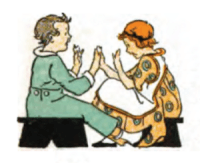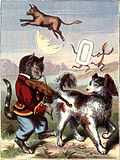A-Tisket, A-Tasket
| "A Tisket A Tasket" | |
|---|---|
| Roud #13188 | |
| Song | |
| Written | USA |
| Form | Nursery rhyme |
| Writer | Traditional |
| Language | English |
| Recorded by | Ella Fitzgerald (1938) |
"A Tisket A Tasket" is a nursery rhyme first recorded in America in the late nineteenth century.[1][2] It was used as the basis for a very successful and highly regarded 1938 recording by Ella Fitzgerald. It has a Roud Folk Song Index number of 13188.
Traditional lyrics
The rhyme was first noted in the United States in 1879[3] as a children's rhyming game. It was sung while children danced in a circle. One of the number ran on the outside of the circle and dropped a handkerchief. The nearest child would then pick it up and chase the dropper. If caught the dropper either was kissed, joined the circle, or had to tell the name of their sweetheart.[2] An early noted version had the lyrics:
- A-tisket a-tasket
- A green and yellow basket
- I wrote a letter to my love
- And on the way I dropped it,
- I dropped it,
- I dropped it,
- And on the way I dropped it.
- A little boy he picked it up and put it in his pocket.[2]
In some variants, the second line is "I lost my yellow basket". In other variants, the last line is "A little girl picked it up and put it in her pocket".
In nineteenth-century England, the rhyme used in the same game had somewhat different but evidently related words:
- I lost my supper, last night,
- And the night before,
- And if I do this night,
- I never will no more.
- I sent a letter to my love,
- I carried water in my glove,
- And by the way I dropped it, I did so, I did so:
- I had a little dog that said bow-wow!
- I had a little cat that said meow-meow!
- Shan't bite you, shan't bite you,
- Shall bite you.
- I dropt it, I dropt it,
- And by the way I lost it.[4]
Lyrics by Ella Fitzgerald
Ella Fitzgerald, in conjunction with Al Feldman (later known as Van Alexander), extended and embellished the rhyme into a jazz piece which was her breakthrough hit with the Chick Webb Orchestra in 1938. It has since become a jazz standard.[3] A follow-up song written by Fitzgerald and Webb entitled "I Found My Yellow Basket" (1938) was less successful.
In popular culture
As a recording
The song was a major hit of the "pre-chart" era, reaching number one in Billboard's sheet music and Record Buying Guide (jukebox) charts, also number 1 on "Your Hit Parade".[5] Fitzgerald also performed the song in Ride 'Em Cowboy (1942).[6]
"Tommy Walsh's Eco House" by the band Half Man Half Biscuit on their 2011 album 90 Bisodol (Crimond) quotes the song.
In movies
The music for the song was used in the opening scene of John Ford's 1940 film The Grapes of Wrath to help establish the contemporary time frame of the events of the film.
A rendition of the song was also performed in the Paul Thomas Anderson movie, The Master.
Notes
- ↑ W. E. Studwell and M. Baldin, The big band reader: songs favored by swing era orchestras and other popular ensembles (Haworth Press, 2000), p. 35.
- ↑ 2.0 2.1 2.2 Brewster, Paul G. (1976). Children's games and rhymes Volume 1 of Studies in play and games. Volume 1 of Studies in play and games. Ayer Publishing,. pp. 82 section C. ISBN 0-405-07914-1. Retrieved 2010-06-09.
- ↑ 3.0 3.1 Studwell, William Emmett; Baldin, Mark (2000). The big band reader: songs favored by swing era orchestras and other popular ensembles - Resources in music history. Routledge. p. 35. ISBN 978-0-7890-0914-2.
- ↑ Northall, G. F. English Folk-Rhymes: A collection of traditional verses relating to places and persons, customs, superstitions, etc. 1892. pg. 364
- ↑ Songs from the Year 1938 - The World's Music Charts at tsort.info (retrieved 2010-1-22)
- ↑ Parlor songs
| ||||||||

